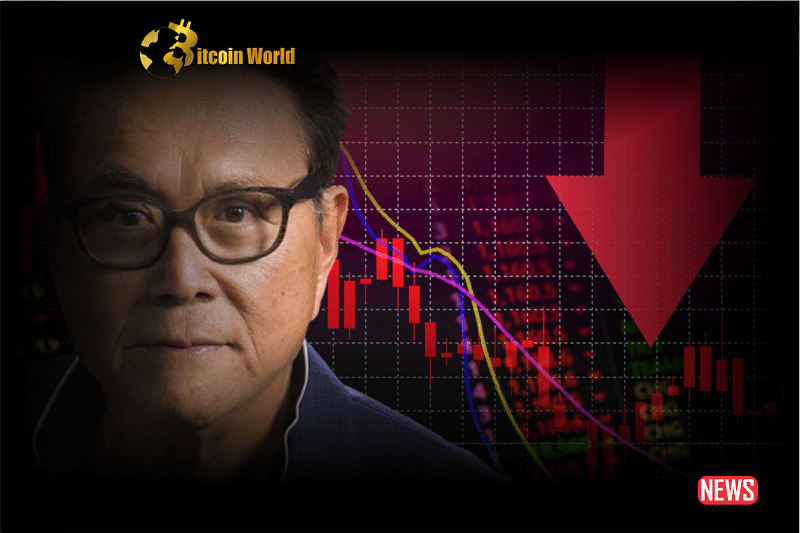Are you feeling a bit uneasy about the economy lately? You’re not alone. Robert Kiyosaki, the renowned author of “Rich Dad Poor Dad,” is sounding the alarm bells. His latest warning comes hot on the heels of a significant move by the credit rating agency Fitch: downgrading the United States’ credit rating. Let’s dive into what this means and why someone like Kiyosaki is paying close attention.
Why Did Fitch Downgrade the US Credit Rating?
Last week, Fitch made headlines by lowering the long-term credit rating of the United States from a pristine “AAA” to “AA+”. Think of it like this: a AAA rating is like getting straight As in school – it signifies the lowest expectation of default. A downgrade to AA+ still indicates a very low risk of default, but it signals a shift, a note of caution. So, what prompted this decision?
Fitch pointed to a couple of key factors:
- Anticipated Fiscal Deterioration: They’re concerned about the future health of the nation’s finances. This includes things like government spending and revenue.
- Growing Government Debt Burden: The US government’s debt has been increasing, and Fitch sees this as a significant concern.
What Does Robert Kiyosaki Say About This?
Robert Kiyosaki, known for his often contrarian views and warnings about the financial system, didn’t mince words. He took to social media, stating, “First shoe to drop. Fitch rating services downgrades the US credit rating from AAA to AA+. Brace for a crash landing. Sorry for the bad news yet I have been warning for over a year.”
This isn’t the first time Kiyosaki has raised concerns. He’s been consistently highlighting what he sees as worrying signs in the economy, including:
- The Potential for a Severe Stock Market Crash: He believes the stock market might be overvalued and vulnerable to a significant downturn.
- The Looming Possibility of an Economic Depression: Kiyosaki has expressed fears of a more prolonged and severe economic downturn.
Kiyosaki’s Investment Strategy: How to Navigate the Turbulence?
So, if Kiyosaki is so concerned, what does he suggest we do? His investment strategy often revolves around what he calls “real money and real assets.” Let’s break that down:
- Gold and Silver: These precious metals are often seen as safe havens during times of economic uncertainty. They tend to hold their value, or even increase, when traditional assets like stocks struggle.
- Bitcoin (BTC): Kiyosaki is a vocal proponent of Bitcoin, viewing it as a hedge against inflation and the potential devaluation of fiat currencies.
It’s worth noting that Kiyosaki has a track record of making bold predictions. He famously predicted the 2008 financial crisis, although the timing of events might not always align perfectly with his initial projections. His perspective offers a valuable, albeit sometimes unconventional, viewpoint for investors to consider.
What Are the Broader Implications of the Downgrade?
While a single credit rating downgrade might not immediately trigger a catastrophic economic event, it’s a signal that shouldn’t be ignored. Here are some potential implications:
- Increased Borrowing Costs: A lower credit rating can make it more expensive for the US government to borrow money. This could lead to higher interest rates on government bonds.
- Impact on Other Interest Rates: Government bond yields often influence other interest rates, such as mortgages and loans. Therefore, a downgrade could indirectly affect borrowing costs for individuals and businesses.
- Investor Sentiment: Downgrades can shake investor confidence, potentially leading to market volatility.
- A Wake-Up Call for Fiscal Policy: This could prompt discussions and potential adjustments to government spending and debt management.
Is This Time to Panic?
While Kiyosaki’s warnings can sound alarming, it’s crucial to maintain a balanced perspective. Economic forecasting is complex, and no one can predict the future with certainty. However, the Fitch downgrade and Kiyosaki’s concerns highlight the importance of being informed and prepared. Consider these actionable insights:
- Stay Informed: Keep up-to-date with economic news and analysis from various sources.
- Diversify Your Investments: Don’t put all your eggs in one basket. A diversified portfolio can help mitigate risk.
- Assess Your Risk Tolerance: Understand your comfort level with potential market fluctuations.
- Consider Long-Term Goals: Make investment decisions that align with your long-term financial objectives.
- Seek Professional Advice: Consult with a financial advisor for personalized guidance.
The Takeaway: Navigating Economic Uncertainty
The US credit rating downgrade by Fitch, coupled with Robert Kiyosaki’s cautionary stance, serves as a reminder that the economic landscape is constantly evolving. While predictions of a “crash landing” might sound dramatic, they underscore the importance of vigilance and proactive financial planning. Whether you agree with Kiyosaki’s specific outlook or not, his perspective encourages us to think critically about economic trends and make informed decisions to navigate potential turbulence. It’s a call to be aware, be prepared, and perhaps, consider what “real assets” mean in your own financial strategy.
Disclaimer: The information provided is not trading advice, Bitcoinworld.co.in holds no liability for any investments made based on the information provided on this page. We strongly recommend independent research and/or consultation with a qualified professional before making any investment decisions.




